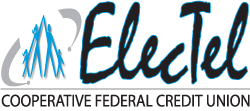Frequently Asked Questions for ElecTel Cooperative Federal Credit Union
How can I join ElecTel?
You can join ElecTel if you are a member/consumer (or a family member) of one of the 27 electric cooperatives located in North Carolina.
You are also eligible for membership if you are an employee, director, or officer of the electric and telephone cooperatives located in North Carolina, Virginia, Maryland, Delaware, Tennessee, and West Virginia.
Family members – anyone related by blood, marriage, or adoption – are also eligible for membership.
How do I access Bill Pay?
You can sign up for FREE Bill Pay by logging on to Home Banking and clicking on Pay Bills.
How will Bill Pay cost me?
It’s a FREE service, UNLIMITED transactions.
What is Home Banking?
Home Banking is our internet “banking” service. Home Banking allows members of the credit union to access their account 24 hours a day, seven days a week – for FREE!
How do I sign up for Home Banking?
Contact us at 1-800-849-5600 to enroll.
What is my member number for Home Banking?
Your member number is your ElecTel savings account number (without using a suffix).
If I withdraw money from my account through Home Banking, when will my check be processed?
Withdrawal requests received through Home Banking will be processed and mailed the next business day.
Can I transfer between joint accounts?
Yes. Transfers between joint accounts can be performed. Please notify the credit union in order for us to set up this capability on your accounts.
What's a Credit Union?
A credit union is a cooperative, not-for-profit financial institution organized to promote thrift and provide credit to members. It is member-owned and controlled through a board of directors elected by the membership. The board serves on a volunteer basis and may hire a management team to run the credit union. The board also establishes and revises policy, sets dividend and loan rates, and directs certain operations. The result: members are provided with a safe, convenient place to save and borrow at reasonable rates at an institution which exists to benefit them, not to make a profit.
Who owns a Credit Union?
Most financial institutions are owned by stockholders, who own a part of the institution and intend on making money from their investment. A credit union doesn’t operate in that manner. Rather, each credit union member owns one “share” of the organization. The user of credit union services is also an owner, and is even entitled to vote on important issues, such as the election of member representatives to serve on the board of directors.
What is the purpose of a Credit Union?
The primary purpose in furthering their goal of service is to encourage members to save money. Another purpose is to offer loans to members. In fact, credit unions have traditionally made loans to people of ordinary means. Credit unions can charge lower rates for loans (as well as pay higher dividends on savings) because they are nonprofit cooperatives. Rather than paying profits to stockholders, credit unions return earnings to members in the form of dividends or improved services.
Are savings deposits insured?
Yes. All savings accounts are insured up to $250,000 by the NCUA, the National Credit Union Administration, an agency of the federal government.


